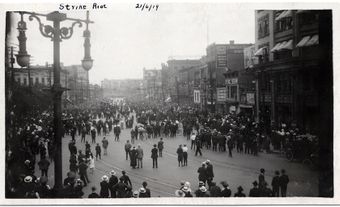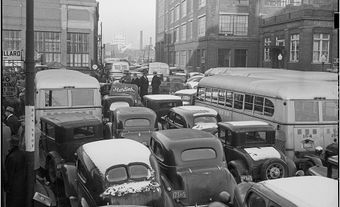Newfoundland Loggers' Strike
The Newfoundland Loggers' Strike began 31 December 1958 when hundreds of loggers employed by Anglo-Newfoundland Development Co at Grand Falls struck for wage increases and for improvements in living conditions at wood camps. The AND Co was determined not to settle with the loggers' union, the International Woodworkers of America. The IWA and its charismatic leader, H. Landon Ladd, had been invited to Newfoundland in 1956 by loggers who wanted it to replace the weak and ineffective Newfoundland Loggers' Association. The company, the NLA executive and Newfoundland's media fought the IWA's raid on the NLA membership, portraying its organizers as violent radicals. The IWA counterattacked in full-page newspaper ads and radio broadcasts.
Newfoundland public opinion gradually went against the IWA while most loggers voted to have it as their union. For 6 weeks the strike was a normal labour dispute, but public opposition to the IWA reached such a pitch that on 12 February 1959 Premier Joseph SMALLWOOD intervened. He declared he would drive the IWA out of Newfoundland and had the legislature pass a law stripping the IWA of its legal bargaining rights.
The CANADIAN LABOUR CONGRESS, the International Labour Organization and much of the Canadian media community condemned Smallwood for "his attempt to destroy free trade unionism." But in Newfoundland public support for the legislation grew when on March 10 a policeman was killed in a confrontation with picketers. Smallwood replaced the IWA with the government-sponsored Newfoundland Brotherhood of Wood Workers. The loggers quickly signed a contract with AND almost identical to the one proposed by the IWA, thus ending the strike. Two years later, Smallwood turned the NBWW over to the United Brotherhood of Carpenters and Joiners. The CLC suspended the UBCJ for its collusion with Smallwood, but the suspension was ineffective. Against the will of the loggers, the UBCJ became their official bargaining agent. Smallwood and the paper companies had successfully driven the IWA from Newfoundland.

 Share on Facebook
Share on Facebook Share on X
Share on X Share by Email
Share by Email Share on Google Classroom
Share on Google Classroom


